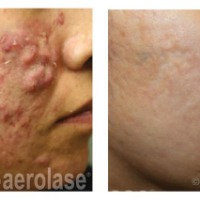Acne is a chronic condition that affects over 85% of adolescents and young adults and is the most common skin disease treated by physicians. A recent study showed that two thirds of teenagers with acne wanted to talk to their physician about their acne, but only one third actually did.
What causes acne?
In order to properly diagnose and treat acne, it helps to understand what happens to induce the condition in the first place. Natural bacteria known as Propionibacterium acnes are present in the skin, and people with acne have more of that bacteria in their follicles than people without acne. Inflammation occurs when an enzyme produced by white blood cells damages the wall of the follicle. As the contents of the follicle move into the dermis an inflammatory response is triggered which results in red bumps, pustules, and nodules. Furthermore, the bacteria will promote formation of free fatty acids which cause additional irritation and inflammation. The key to prevent and treat inflammation is to kill the bacteria and imposes skin irritation. Acne treatments vary depending on the type of acne; however, thanks to modern technology there are many effective options available. Some of the more effective methods include
- Aerolase NeoClear : "This is the only laser for achieving long-lasting results for active acne," - Dr. Bruce Katz, New York City dermatologist.
- Fraxel for skin resurfacing and to repair acne scarring,
- Smoothbeam Laser Acne Treatment,
- ClearLight Acne Treatment,
- Omnilux Light Treatment,
- Levulan or Blu-U
- Aesthera PPx Photopneumatic Therapy
- Aura by Laserscope
- N-Light Laser Acne Treatment.
Seven Causes Of Acne
- Genetics - if one or both of your parents suffered from acne, your chances of having it are greater.
- Hormones - Hormones known as androgens become active and stimulate oil glands in your skin, which increases oil production. More oil clogs pores, causing pimples and blackheads. Changes in hormone levels that occur during your period or when you start or stop taking birth control pills can also cause an acne flare-up. In some cases, however, certain birth control pills are prescribed as a treatment for acne.
- Stress - Although stress doesn't actually cause acne, it will potentially aggravate this or any other skin condition you may have.
- Diet - Although dermatologists aren't sure whether or not diet plays a critical role in acne, some experts do believe that food allergies can trigger acne outbreaks.
- Washing your face too often - Aggravating the skin can trigger acne.
- Greasy skin care products and oily cosmetics - Any product that clogs oil ducts may cause acne.
Medications - Acne can be a side effect of some drugs, including barbiturates, seizure medication and steroids.
Body acne
Body acne is common in adults and teens, and it appears mostly on the back, chest, and buttocks. Like facial acne, hormones can cause these blemishes. Several other factors can induce acne lesions on the body, but most commonly it is caused by perspiration and tight-fitting clothing.
















